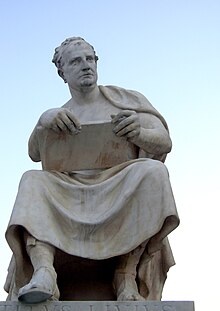Livy | |
|---|---|
 Titus Livius statue (latter 19th century) at the Austrian Parliament Building in Vienna | |
| Born | Titus Livius[i] 59 BC |
| Died | AD 17 (aged 74–75) Patavium, Roman Empire |
| Occupation | Historian |
| Years active | Golden Age of Latin |
| Academic background | |
| Influences | |
| Academic work | |
| Discipline | History |
| Main interests | History, biography, oratory |
| Notable works | Ab urbe condita |
Titus Livius (Latin: [ˈtɪtʊs ˈliːwiʊs]; 59 BC – AD 17), known in English as Livy (/ˈlɪvi/ LIV-ee), was a Roman historian. He wrote a monumental history of Rome and the Roman people, titled Ab Urbe Condita, ''From the Founding of the City'', covering the period from the earliest legends of Rome before the traditional founding in 753 BC through the reign of Augustus in Livy's own lifetime. He was on good terms with members of the Julio-Claudian dynasty and was a friend of Augustus,[1] whose young grandnephew, the future emperor Claudius, he encouraged to take up the writing of history.[2]
Cite error: There are <ref group=lower-roman> tags or {{efn-lr}} templates on this page, but the references will not show without a {{reflist|group=lower-roman}} template or {{notelist-lr}} template (see the help page).